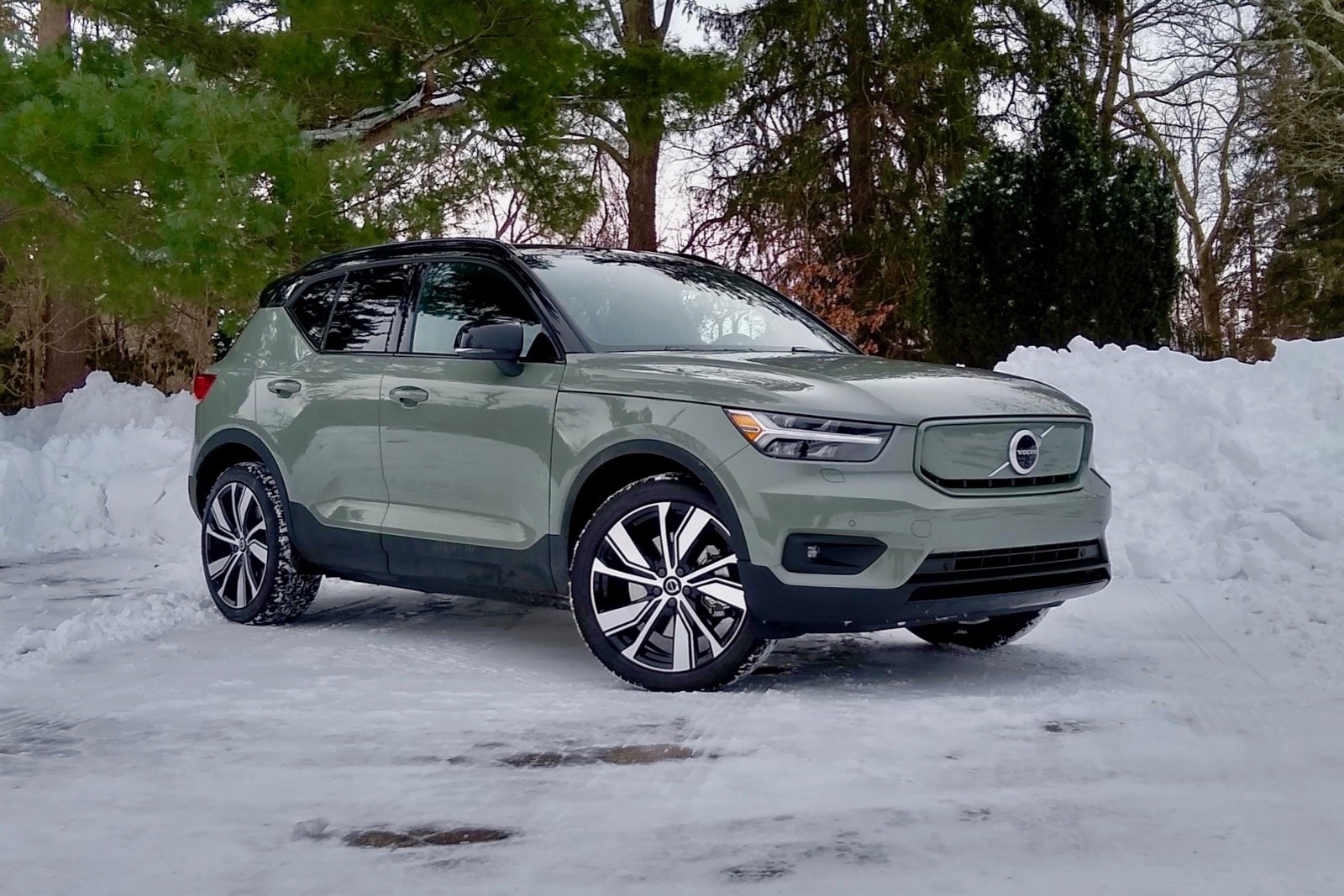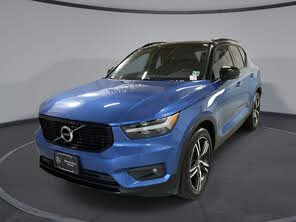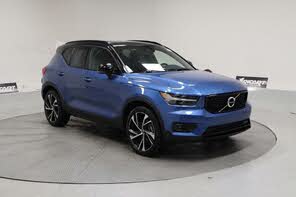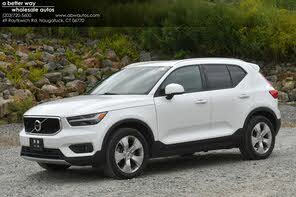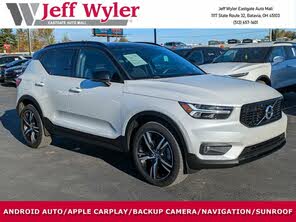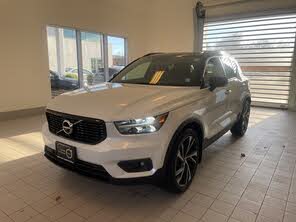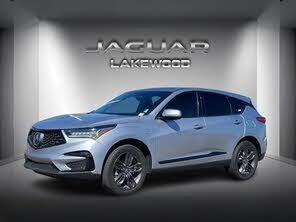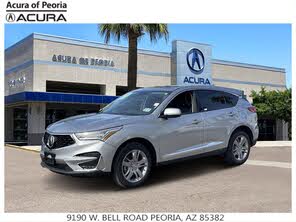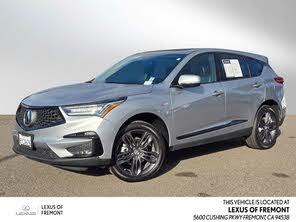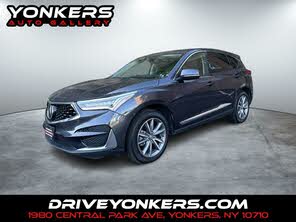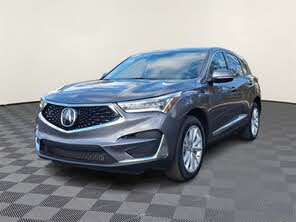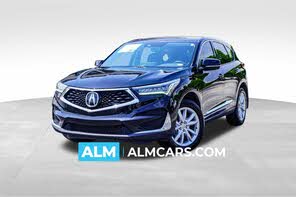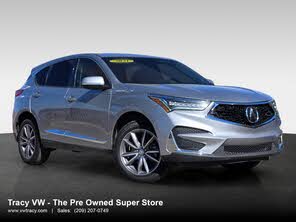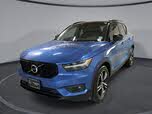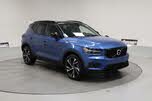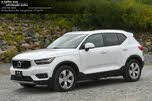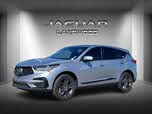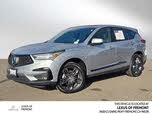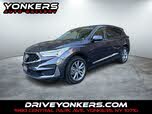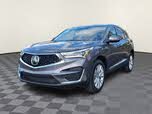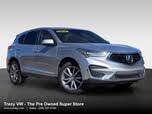2021 Volvo XC40 vs 2021 Acura RDX
Overview | |
MSRP$33,700 | MSRP$38,400 |
Average price$26,254 | Average price$30,228 |
Listings177 | Listings817 |
Ratings & Reviews | |
User Reviews | User Reviews |
Expert reviews8.0 out of 10 | Expert reviews8.2 out of 10 |
Pros
| Pros
|
2021 Volvo XC40 Reviews SummaryIntroduced for the 2019 model year, the Volvo XC40 enters 2021 with one major change—the addition of an all-electric powertrain option. The 2021 Volvo XC40 Recharge is the Swedish automaker’s first mass-market electric vehicle, in fact. The Recharge will be sold alongside gasoline versions of the XC40, which carry over largely unchanged, and compete against small luxury crossovers like the Audi Q3, BMW X1, Mercedes-Benz GLA-Class, and Lexus UX. With its electric powertrain, the Recharge is a de facto Tesla Model Y competitor. It’s also priced similar to high-end versions of the Ford Mustang Mach-E, although the two electric crossovers have somewhat different philosophies. In addition to that zero-emission powertrain, the Recharge gets an Android-based operating system, over-the-air (OTA) software update capability for all vehicle systems, and some updates to driver-assist tech. These changes don’t apply to gasoline 2021 XC40 models, but Volvo does plan to add the Android operating system to more vehicles in the future. Since the Recharge is the main new thing for the 2021 XC40, that’s what we focused on for this review. While the gasoline XC40 is available in three trim levels—Momentum, R-Design, and Inscription—with front-wheel drive (FWD) or all-wheel drive (AWD), the Recharge is only offered in a single trim level, with standard AWD. | |
2021 Acura RDX Reviews SummaryWhen Acura last redesigned the RDX for the 2019 model year, the company began a transformation that is now accelerating with the debut of the all-new 2021 TLX sedan and soon-to-arrive 2022 MDX SUV. Adopting the company’s latest exterior styling and interior design philosophies, as well as the completely rethought True Touch Interface infotainment system, the third-generation RDX confirmed Acura’s intent to return to the performance ethos that guided the brand during its early years. Now, according to Acura, the RDX is the bestselling model in its segment and one of the bestselling luxury vehicles in America. It is deserving of this stature. | |
No video found | |
Popular Features & Specs | |
Engine2.0L 187 hp I4 | Engine2.0L 272 hp I4 |
Drive TrainFWD | Drive TrainFWD |
Seating Capacity5 | Seating Capacity5 |
Horsepower187 hp @ 4700 rpm | Horsepower272 hp @ 6500 rpm |
MPG City23 | MPG City22 |
MPG Highway32 | MPG Highway28 |
Engine | |
Engine Name2.0L 187 hp I4 | Engine Name2.0L 272 hp I4 |
Torque221 lb-ft @ 1400 rpm | Torque280 lb-ft @ 1600 rpm |
Horsepower187 hp @ 4700 rpm | Horsepower272 hp @ 6500 rpm |
DrivetrainFWD | DrivetrainFWD |
Fuel Economy | |
MPG City23 | MPG City22 |
MPG Highway32 | MPG Highway28 |
Interior | |
Leather SeatsStandard | Leather Seats |
Seating Capacity5 | Seating Capacity5 |
Key Features | |
Sunroof/Moonroof | Sunroof/MoonroofStandard |
Safety | |
Front Crash Overall5 | Front Crash Overall4 |
Side Crash Overall5 | Side Crash Overall5 |
Dimensions & Capacity | |
Cargo Space20.7 cu ft | Cargo Space29.5 cu ft |
Curb Weight3627 lbs | Curb Weight3783 lbs |
Height65.3 in | Height65.7 in |
Length174.2 in | Length186.6 in |
Width80.1 in | Width74.8 in |
Wheelbase106.4 in | Wheelbase108.3 in |
Maximum Payload1133 lbs | Maximum Payload1001 lbs |
Number of doors4 | Number of doors4 |
Maximum Towing Capacity3500 lbs | Maximum Towing Capacity1500 lbs |
Overview | ||
MSRP | $33,700 | $38,400 |
Average price | $26,254 | $30,228 |
Listings | ||
Ratings & Reviews | ||
User reviews | ||
Expert reviews | 8.0 out of 10Read full review | 8.2 out of 10Read full review |
Pros & cons | Pros
| Pros
|
Summary | Introduced for the 2019 model year, the Volvo XC40 enters 2021 with one major change—the addition of an all-electric powertrain option. The 2021 Volvo XC40 Recharge is the Swedish automaker’s first mass-market electric vehicle, in fact. The Recharge will be sold alongside gasoline versions of the XC40, which carry over largely unchanged, and compete against small luxury crossovers like the Audi Q3, BMW X1, Mercedes-Benz GLA-Class, and Lexus UX. With its electric powertrain, the Recharge is a de facto Tesla Model Y competitor. It’s also priced similar to high-end versions of the Ford Mustang Mach-E, although the two electric crossovers have somewhat different philosophies. In addition to that zero-emission powertrain, the Recharge gets an Android-based operating system, over-the-air (OTA) software update capability for all vehicle systems, and some updates to driver-assist tech. These changes don’t apply to gasoline 2021 XC40 models, but Volvo does plan to add the Android operating system to more vehicles in the future. Since the Recharge is the main new thing for the 2021 XC40, that’s what we focused on for this review. While the gasoline XC40 is available in three trim levels—Momentum, R-Design, and Inscription—with front-wheel drive (FWD) or all-wheel drive (AWD), the Recharge is only offered in a single trim level, with standard AWD. | When Acura last redesigned the RDX for the 2019 model year, the company began a transformation that is now accelerating with the debut of the all-new 2021 TLX sedan and soon-to-arrive 2022 MDX SUV. Adopting the company’s latest exterior styling and interior design philosophies, as well as the completely rethought True Touch Interface infotainment system, the third-generation RDX confirmed Acura’s intent to return to the performance ethos that guided the brand during its early years. Now, according to Acura, the RDX is the bestselling model in its segment and one of the bestselling luxury vehicles in America. It is deserving of this stature. |
Video | No video found | |
Popular Features & Specs | ||
Engine | 2.0L 187 hp I4 | 2.0L 272 hp I4 |
Drive Train | FWD | FWD |
Seating Capacity | 5 | 5 |
Horsepower | 187 hp @ 4700 rpm | 272 hp @ 6500 rpm |
MPG City | 23 | 22 |
MPG Highway | 32 | 28 |
Engine | ||
Engine Name | 2.0L 187 hp I4 | 2.0L 272 hp I4 |
Torque | 221 lb-ft @ 1400 rpm | 280 lb-ft @ 1600 rpm |
Horsepower | 187 hp @ 4700 rpm | 272 hp @ 6500 rpm |
Drivetrain | FWD | FWD |
Fuel Economy | ||
MPG City | 23 | 22 |
MPG Highway | 32 | 28 |
Interior | ||
Leather Seats | Standard | |
Seating Capacity | 5 | 5 |
Key Features | ||
Sunroof/Moonroof | Standard | |
Safety | ||
Front Crash Overall | 5 | 4 |
Side Crash Overall | 5 | 5 |
Dimensions & Capacity | ||
Cargo Space | 20.7 cu ft | 29.5 cu ft |
Curb Weight | 3627 lbs | 3783 lbs |
Height | 65.3 in | 65.7 in |
Length | 174.2 in | 186.6 in |
Width | 80.1 in | 74.8 in |
Wheelbase | 106.4 in | 108.3 in |
Maximum Payload | 1133 lbs | 1001 lbs |
Number of doors | 4 | 4 |
Maximum Towing Capacity | 3500 lbs | 1500 lbs |
The 2021 Volvo XC40 exuded a classic SUV demeanor, a departure from its more sleek and modern contemporaries in the small luxury crossover segment. It featured a tall, flat roof and an upright rear hatch, reminiscent of traditional utility vehicles. Key elements such as the “Thor’s Hammer” LED headlights and a simple oval grille made the XC40 a seamless part of the Volvo family. To add a retro touch, gasoline models of the XC40 were available with a contrasting white roof.
Distinguishing the electric XC40 Recharge from its gasoline-powered siblings, were features like a blanked-off grille, subtle "Recharge" badging, bespoke alloy wheels (standard 19-inch or optional 20-inch), a gloss black roof, and mirror caps. These design tweaks, along with model-exclusive Sage Green Metallic paint, provided just enough distinction without being overly showy. Another unique feature was the charging port located where the fuel filler normally sits.
Riding on Volvo's Compact Modular Architecture (CMA) platform, the same which underpinned the Polestar 2, the XC40 was purpose-built to handle both gasoline and electric powertrains. Its interior was minimalistic yet luxurious, featuring a blend of Nappa leather and Nubuck textile for upholstery, and real metal trim on the dashboard. The design coherence, from the portrait-oriented touchscreen to the air vents, was both seamless and appealing.
In contrast, the 2021 Acura RDX, especially with the optional A-Spec Package, stood out as a dynamic and stylish SUV. The A-Spec’s changes were subtle yet effective, adding to its sporty look without falling into the trap of overdesigned performance cues. The RDX did not try to masquerade as a rugged off-roader; it was unmistakably a vehicle designed for urban commuting and road-tripping, devoid of unnecessary off-roading frills like skid plates and bulging fender flares.
The RDX A-Spec sat comfortably in the middle of the trim hierarchy. It presented a more polished cabin experience with exclusive sport seats, a sport steering wheel, and dark brushed aluminum trim. This variant also brought red exposed stitching and ambient lighting, establishing an upscale yet sporty ambiance. The use of materials in the RDX was quality-driven, and unique gauges enhanced the sport-inspired interior—though some drivers found the red markings on a brushed silver background difficult to read during daylight.
The 2021 Volvo XC40 offered a versatile powertrain lineup with three distinct options. The gasoline versions came with a 2.0-liter turbocharged four-cylinder engine. The front-wheel-drive T4 produced 187 horsepower and 221 pound-feet of torque, while the all-wheel-drive T5 upped the ante with 248 horsepower and 258 pound-feet of torque. The electric Recharge model, sporting an identical powertrain to the Polestar 2, delivered a combined 402 horsepower and 486 pound-feet of torque through its dual electric motors. A notable aspect was the 78-kilowatt-hour battery pack, strategically placed under the floor and within the transmission tunnel space, offering a usable capacity of 75 kWh.
The XC40 Recharge demonstrated impressive acceleration, reaching zero to 60 mph in 4.7 seconds, outpacing some electric rivals like the Tesla Model Y Long Range by a hair. Gasoline models also showed respectable performance with the T5 hitting 60 mph in 6.1 seconds and the T4 in 8.1 seconds. All versions were electronically limited to a top speed of 112 mph as part of Volvo's safety initiatives. The XC40 Recharge emphasized smoothness and comfort over raw speed, even featuring a regenerative braking system for one-pedal driving, enhancing fuel efficiency and convenience.
On the other hand, all 2021 Acura RDX models, including the A-Spec, were powered by a turbocharged 2.0-liter four-cylinder engine generating 272 horsepower at 6,500 rpm and 280 pound-feet of torque from 1,600 rpm to 4,500 rpm. This engine was paired with a 10-speed automatic transmission and came standard with front-wheel drive. Buyers had the option of Acura's Super Handling All-Wheel Drive (SH-AWD) system, which significantly improved road handling by directing up to 70% of engine output to the rear wheels and varying power between rear wheels for optimized performance.
The RDX featured an Integrated Dynamics System with multiple driving modes—Snow, Comfort, Sport, and Sport+—each altering powertrain behavior, steering response, and, in higher trims like the Advance Package, adaptive suspension settings. Despite its size, the RDX was fun to drive, thanks to the responsive turbo engine, communicative steering, well-modulated brakes, and SH-AWD system. The A-Spec trim added Shark Gray 20-inch wheels with performance all-season tires, further enhancing its driving engagement, though some critique persisted regarding its body motion and lack of adaptive dampers.
The 2021 Volvo XC40 was designed with practicality in mind, though its interior space wasn't groundbreaking. Volvo reported identical passenger and cargo volumes for both the Recharge and gasoline models. However, in comparison to rivals like the Tesla Model Y and Ford Mustang Mach-E, the XC40 lagged in legroom, headroom, and cargo space. Notably, the XC40 Recharge’s frunk was quite limited due to powertrain components occupying the under-hood area.
Despite its standard space constraints, Volvo ingeniously optimized available storage. Clever features like a removable trash bin in the center console, a bag hook in the glovebox, and the relocation of Harman Kardon audio system speakers to the dashboard allowed for larger door bins. An adequately shaped storage cubby was positioned ahead of the shifter, with a single USB-C port as standard and an optional wireless charging pad. However, the absence of additional phone-charging options for rear-seat passengers was a downside.
Conversely, the Acura RDX excelled in packaging and use of space. Its front seats, especially with A-Spec trim, provided 12-way power adjustment, heating, and ventilation, ensuring comfort and support for spirited driving. However, the design to maximize cargo room compromised rear-seat leg support and comfort. The rear seats lacked adequate cushioning, causing passengers to slouch uncomfortably.
While the official cargo volume numbers might not impress, the RDX’s trunk was practical and functional. It offered 29.5 cubic feet of space behind the rear seat, supplemented by a deep storage well to the left, perfect for securing groceries. Lift the cargo floor, and three separate compartments provided organized storage solutions. Folding the rear seats down increased the cargo room to 58.9 cubic feet, competitive yet not class-leading. Acura also quoted a maximum cargo volume of 79.8 cubic feet, but this measurement assumed packing cargo right behind the front seats.
The 2021 Volvo XC40 Recharge introduced the Android Automotive OS infotainment system, initially launched in the Polestar 2, while gasoline models maintained Volvo’s familiar system. The key feature of the Android Automotive OS was the integration of Google services, including Google Assistant and Google Maps. This setup allowed Android phone users to sync personal Google accounts, adding a layer of customization not found in conventional systems. The standard hardware package boasted a 9-inch touchscreen and a 12.3-inch digital instrument cluster, offering sharp graphics and user-friendly menus, albeit adhering to Google’s user interface style, which could be polarizing.
Another groundbreaking feature for the Recharge was OTA update capacity, potentially allowing for improvements and new features without visiting the dealership. Recharge models eschewed a traditional start button; merely entering the car with the key fob allowed drivers to engage the vehicle by shifting out of park.
The 2021 Acura RDX featured the True Touchpad Interface (TTI) infotainment system, which substituted conventional touchscreen control for a touch-sensitive pad on the center console. This attempt to improve on Lexus’s earlier similar systems meant the touchpad mirrored the screen layout, albeit requiring a learning curve for users more accustomed to traditional touchpads. While innovative, it didn’t fully eliminate distraction and proved complex for unfamiliar passengers.
Still, the RDX incorporated many practical technologies, such as physical knobs for audio and climate control, Apple CarPlay, and Android Auto. Notably, the A-Spec trim included a premium 16-speaker Acura/ELS Studio 3D audio system, which delivered an outstanding auditory experience.
Safety was a strong suit for the 2021 Volvo XC40, particularly for gasoline models. It secured top marks across the board, earning the highest “Top Safety Pick+” rating from IIHS and a five-star overall rating from NHTSA, with near-perfect scores in most crash tests. Although the electric XC40 Recharge hadn’t been tested due to structural differences from the gasoline models, Volvo’s rigorous safety designs, including a protective battery cage and reinforced front crash structure, promised superior safety.
Standard safety features in the XC40 included lane-keep assist, blind-spot monitoring with rear cross-traffic alert, automatic emergency braking, and several others. Advanced options offered further security, such as traffic-sign recognition and Volvo's semi-autonomous Pilot Assist system. Recharge variants received Volvo’s latest radar-enhanced sensor suite, paving the way for future driver-assistance features.
Similarly, the 2021 Acura RDX came equipped with AcuraWatch, which included adaptive cruise control, lane-keep assist, and automatic emergency braking. Nevertheless, essential features like blind-spot monitoring and rear cross-traffic alert required an upgrade to the Technology Package. Unlike its sedan counterpart, the TLX, the RDX did not offer pedestrian detection, traffic-sign recognition, or Traffic Jam Assist.
Despite these omissions, the Acura RDX earned IIHS "Top Safety Pick+" and NHTSA five-star overall ratings, establishing itself as a securely tested vehicle. The AcuraWatch systems were notably smoother and more user-friendly compared to earlier models.
CarGurus highlights

According to CarGurus experts, the overall rating for the 2021 Volvo XC40 is 8.0 out of 10, while the 2021 Acura RDX scores 8.2 out of 10. Given these scores, the 2021 Acura RDX emerges as the better recommendation. Its superior interior space, engaging driving dynamics, and balanced technology offerings give it a slight edge over the Volvo XC40. The Volvo XC40, while commendable for its build quality and innovative features, falls just short in overall utility and interior comfort compared to the RDX.
Choose the 2021 Volvo XC40 if:
- You value traditional SUV styling with high-quality materials and a minimalist interior.
- Superior ride quality and comfort are your top priorities.
- You’re looking for the latest Google-integrated infotainment system and advanced safety features.
Choose the 2021 Acura RDX if:
- You need more interior space, particularly a practical and well-designed cargo area.
- You prefer a sportier driving experience with an advanced all-wheel drive system.
- Innovative technology and premium audio systems are high on your wishlist.
CarGurus highlights

According to CarGurus experts, the overall rating for the 2021 Volvo XC40 is 8.0 out of 10, while the 2021 Acura RDX scores 8.2 out of 10. Given these scores, the 2021 Acura RDX emerges as the better recommendation. Its superior interior space, engaging driving dynamics, and balanced technology offerings give it a slight edge over the Volvo XC40. The Volvo XC40, while commendable for its build quality and innovative features, falls just short in overall utility and interior comfort compared to the RDX.
Choose the 2021 Volvo XC40 if:
Shop Now- You value traditional SUV styling with high-quality materials and a minimalist interior.
- Superior ride quality and comfort are your top priorities.
- You’re looking for the latest Google-integrated infotainment system and advanced safety features.
Choose the 2021 Acura RDX if:
Shop Now- You need more interior space, particularly a practical and well-designed cargo area.
- You prefer a sportier driving experience with an advanced all-wheel drive system.
- Innovative technology and premium audio systems are high on your wishlist.

By: CarGurus + AI
At CarGurus, our team of experienced automotive writers remain at the heart of our content operation, conducting hands-on car tests and writing insightful guides that are backed by years of industry experience. To complement this, we are harnessing AI to make our content offering more diverse and more helpful to shoppers than ever. To achieve this, our AI systems are based exclusively on CarGurus content, ratings and data, so that what we produce is both unique to CarGurus, and uniquely helpful to car shoppers.
